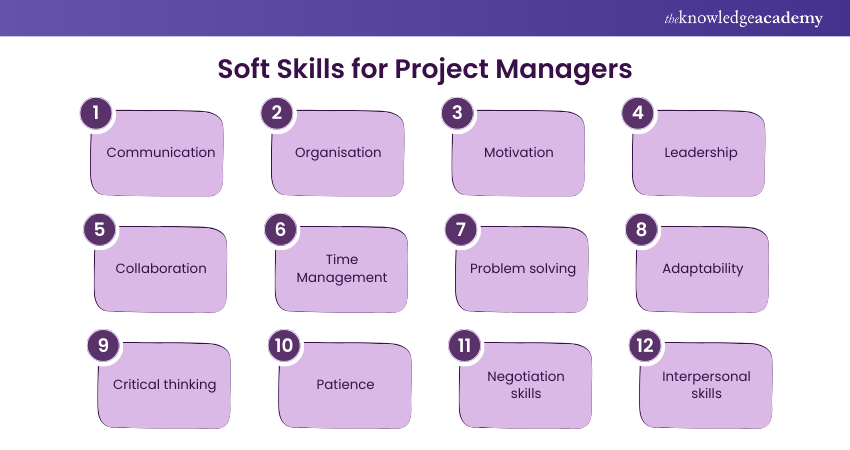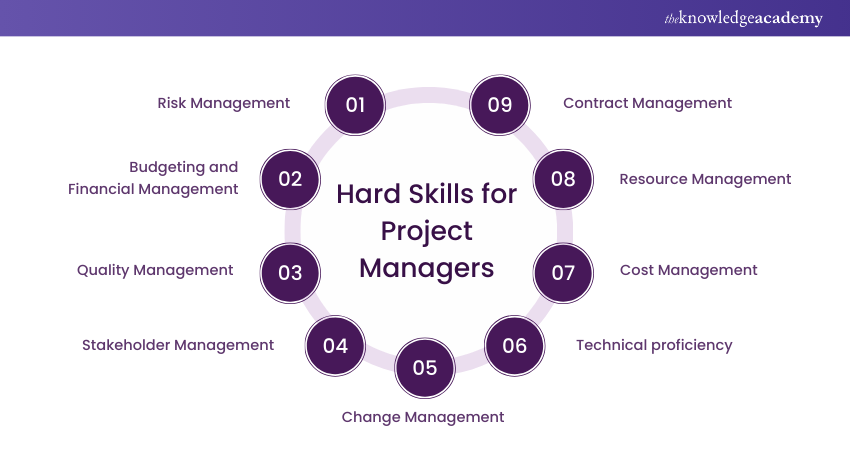We may not have the course you’re looking for. If you enquire or give us a call on 01344203999 and speak to our training experts, we may still be able to help with your training requirements.
Training Outcomes Within Your Budget!
We ensure quality, budget-alignment, and timely delivery by our expert instructors.

Project Management is more than assigning tasks, setting deadlines, and holding meetings. It is a complex and demanding role that requires various Project Management Skills to lead teams and deliver successful projects. As the field of Project Management grows, so does the demand for qualified and skilled Project Managers.
According to the Talent Gap 2021 Report, the world will need 25 million more Project Management professionals by 2030, creating 2.3 million new jobs yearly. To seize these opportunities, you must have the right mix of Project Management Skills, including business acumen, technical expertise, and leadership qualities. In this blog, you will learn about the essential Project Management Skills you need to excel in your career and how to develop them further.
Table of Contents
1) What are Project Management Skills?
2) 10 Soft skills for Project Managers
3) 7 Hard skills for Project Managers
4) 8 Technical skills for Project Managers
5) Conclusion
What are Project Management Skills?
Project Management Skills encompass a range of competencies and proficiencies essential for efficiently planning, executing, and finalising projects. These skills are pivotal in guaranteeing that tasks are completed on time, within budget, and meet predetermined goals. They include strategising project scopes, creating realistic schedules, allocating resources effectively, and managing risks.
Additionally, communication, leadership, and team-building skills are vital for guiding project teams to success. Adaptability and problem-solving skills are equally crucial to address unexpected challenges. Project Management Skills are a dynamic combination of technical expertise, interpersonal capabilities, and strategic thinking, ensuring projects are completed successfully.
Soft skills for Project Managers
Soft skills for Project Managers are the interpersonal and emotional abilities that help them work effectively with their teams, clients, and stakeholders. Some of the examples of soft skills are:

1) Communication
Professionals in Project Management need to be proficient in communication. Poor communication is frequently blamed for projects' missing deadlines, exceeding budget, or otherwise failing.
Effective communication goes beyond simply being able to talk well in front of others; it is crucial. Project Managers need to be aware of who, when, and how often they should communicate with. It can entail establishing expectations for how frequently communications will occur at the start of a project.
2) Organisation
Organisation means effectively planning, prioritising, and managing tasks, resources, and time. Organisation is essential for Project Managers, as they oversee multiple aspects of a project, such as scope, budget, quality, and risks. The organisation helps Project Managers deliver the project on time, within budget, and
3) Motivation
Motivation involves inspiring and encouraging yourself and others to achieve a common goal. Motivation is important for Project Managers, as they must lead and support their team members, who may have different skills, personalities, and backgrounds. Motivation helps Project Managers create a positive and productive work environment where team members are engaged, committed, and satisfied.
4) Leadership
Leadership means influencing, guiding, and directing others towards a shared vision. Leadership is crucial for Project Managers, as they must communicate project objectives, roles, and responsibilities to their team members, stakeholders, and sponsors. Leadership helps Project Managers build trust, confidence, and collaboration among the project participants and resolve any conflicts or issues that may arise.
5) Collaboration
Collaboration forms the bedrock of effective Project Management Skills. It plays a pivotal role in expediting work and enhancing efficiency. Cross-team coordination offers invaluable perspectives and insights that might remain undiscovered within a single team. The involvement of multiple minds inherently nurtures creativity and leads to more well-rounded project outcomes.
Enhancing collaboration skills can be achieved through frequent communication practice. Techniques like active listening, which involves staying fully engaged during conversations, prove instrumental. While seemingly straightforward, mastering open communication, dismantling barriers, and fostering a culture of co-creation is fundamental in building a collaborative, high-performing team.
6) Time management
Time management and organisational skills are intertwined. Enhanced task organisation leads to a more precise workload overview and better estimation of task durations. Nevertheless, it can be challenging to stay focused and effectively prioritise work. Establishing a task priorities list boosts time management skills and mitigates procrastination. By identifying high-priority tasks, you can address them first, ensuring that nothing is overlooked or neglected. This approach aids in staying on top of responsibilities and maintaining productivity.
7) Problem solving
Problem-solving skills are iterative and collaborative abilities that empower individuals to tackle and resolve challenges effectively. Developing these skills involves more than simply possessing the "correct" answer for every issue. It consists in adopting fresh perspectives and methodically working toward solutions.
Enhancing problem-solving capabilities can be achieved through data-driven decision-making frameworks and systematic analyses. For instance, when faced with the challenge of increasing sales by 10% compared to competitors, conducting a competitor research to assess your current market position is essential. Subsequently, employing the insights gained from the analysis to address the sales issue is vital. In this scenario, you might devise a new marketing strategy in coordination with the sales team.
8) Adaptability
In Project Management, change is a constant factor. Whether it's the current project or a future one, aspects of your project plan will inevitably evolve. This could include alterations in deadlines, changes in priorities, or external circumstances that demand adjustments in your workflow. Exceptional Project Managers possess the capacity to pivot and adapt to these new situations while maintaining the project's trajectory.
Becoming more adaptable hinges on your ability to recognising when and how to transition effectively. Achieving this requires a profound understanding of oneself. Developing soft skills, such as self-awareness and mindfulness, can aid in managing your fluctuating emotions, which are particularly relevant during periods of change.
9) Critical thinking
Critical thinking, much like problem-solving, lacks a definitive "solution." Winning or losing isn't the essence of critical thinking, but it instead involves a disciplined approach to problem-solving driven by logic rather than emotions. Proficient Critical thinkers excel at dissecting available information, analysing it, and formulating conclusions grounded in verifiable facts.
In order to cultivate your critical thinking skills, it's crucial to step back and scrutinise your thought process periodically. Ask yourself: How did I arrive at this conclusion? Is there an alternative explanation? Am I letting emotions, rather than factual data, influence my judgment? Emotional decisions have their merits, as passion often leads to sound choices. Nonetheless, critical thinking provides a reliable framework for ensuring that you tackle situations from a rational standpoint.
10) Patience
Patience means remaining calm and composed in stressful or challenging situations. It also means waiting for something without getting frustrated or angry. Patience is an important skill for Project Managers, as they must deal with uncertainty, complexity, and change in their projects. Patience helps Project Managers cope with pressure, adapt to different circumstances, and handle feedback and criticism.
11) Negotiation skills
These skills help you reach an agreement or a compromise with another party. Negotiation skills involve communication, persuasion, problem-solving, and conflict resolution. Negotiation skills are vital for Project Managers, as they must negotiate with various stakeholders on aspects of the project, such as:
a) Scope
b) Budget
c) Quality
d) Deadlines
Negotiation skills help Project Managers achieve a win-win outcome where both parties are satisfied and the project objectives are met.
12) Interpersonal skills
These skills help you interact and communicate effectively with other people. Interpersonal skills include listening, speaking, writing, presenting, and empathising. Interpersonal skills are essential for Project Managers, as they must work with diverse and multidisciplinary teams and establish and maintain good relationships with all project stakeholders.
Interpersonal skills help Project Managers convey information, understand different perspectives, and manage expectations and emotions.
Get a holistic overview of Project Management Office (PMO) components. Register for our Project Management Office Fundamentals Certification Course now!
Hard skills for Project Managers
Hard skills for Project Managers are the technical and measurable abilities required to plan, execute, and control projects successfully. Some of the hard skills for Project Managers are:

1) Risk Management
Risk Management is identifying, analysing, and mitigating potential risks affecting the project’s objectives, scope, quality, cost, or schedule. Risk Management involves:
a) Developing a Risk Management plan
b) Performing risk assessment
c) Implementing risk response strategies
d) Monitoring and controlling risks throughout the project lifecycle
2) Budgeting and Financial Management
Budgeting and Financial Management means the ability to estimate, allocate, and manage the project’s financial resources, such as costs, revenues, and cash flows. Budgeting and Financial Management involve:
a) Developing a project budget
b) Tracking and forecasting project expenditures
c) Controlling project costs
d) Reporting on project financial performance
3) Quality Management
Quality Management ensures that the project’s deliverables meet the stakeholders', customers', and users' expectations and requirements. Quality Management involves:
a) Crafting a Quality Management plan
b) Defining quality standards and metrics
c) Performing quality assurance and quality control activities
d) Implementing quality improvement measures
4) Stakeholder Management
Stakeholder Management is the ability to identify, engage, and communicate with the project’s stakeholders, such as sponsors, customers, users, team members, suppliers, and others who have an interest in or influence on the project. Stakeholder Management involves developing a Stakeholder Management plan, conducting stakeholder analysis, managing stakeholder expectations, and resolving stakeholder issues.
5) Change Management
Change Management is managing and controlling changes during the project lifecycle, such as changes in scope, schedule, cost, quality, or resources. Change Management involves:
a) Developing a Change Management plan
b) Establishing a change control system
c) Evaluating and approving change requests
d) Implementing and communicating changes
6) Technical proficiency
Technical proficiency is the ability to use and apply the relevant technical skills, tools, and methods needed for the project’s domain, industry, or field. Technical proficiency involves having the knowledge and expertise of the project’s subject matter, processes, standards, and best practices and the ability to use the appropriate software, hardware, and equipment.
7) Cost Management
Cost Management is the ability to plan, estimate, and control the project’s costs, such as labour, materials, equipment, and overheads. Cost Management involves:
a) Developing a Cost Management plan
b) Performing cost estimation and budgeting
c) Tracking and forecasting project costs
d) Reporting on project cost performance
8) Resource Management
Resource Management is the ability to plan, acquire, and manage the project’s resources, such as human, physical, financial, and informational resources. Resource Management involves:
a) Developing a Resource Management plan
b) Identifying and allocating project resources
c) Managing resource availability and utilisation
d) Optimising resource efficiency and effectiveness
9) Contract Management
Contract Management is the ability to manage and administer the contracts and agreements involved in the project, such as procurement contracts, service contracts, partnership agreements, and legal documents. Contract Management involves:
a) Developing a Contract Management plan
b) Selecting and negotiating with contractors and suppliers
c) Monitoring and controlling contract performance
d) Closing and terminating contracts
Technical skills for Project Managers
Technical skills for Project Managers are the abilities and knowledge related to the specific technologies, tools, and methods used in managing projects. These skills are essential for Project Managers to plan, execute, monitor, and control projects effectively and efficiently. Some of the technical skills for Project Managers are:
1) Project planning
It involves defining the project scope, objectives, deliverables, milestones, tasks, and resources. Project planning also involves creating a project charter, management plan, and a work breakdown structure. Project planning helps to establish the project direction, scope, and baseline.
2) Project scheduling
It involves developing and maintaining a project schedule that shows the sequence, duration, dependencies, and resources of project activities. Project scheduling also involves using tools like Gantt Charts, Network Diagrams, and Critical Path Analysis. Project scheduling helps to coordinate and track the project's progress and performance.
3) Project scoping
It involves defining and managing the project scope, the set of features, functions, and requirements the project must deliver. Project scoping also involves identifying and controlling the scope changes and ensuring the project meets the stakeholders' expectations and needs. Project scoping helps to avoid scope creep and ensure the project quality.
4) Project forecasting
It involves predicting the future outcomes and trends of the project based on the current data and information. Project forecasting also involves techniques such as earned value, trend, and variance analysis. Project forecasting helps anticipate and mitigate project risks and issues and adjust the project plan accordingly.
5) Project tracking
It involves monitoring and measuring the project performance and progress against the project plan and schedule. Project tracking also involves collecting, analysing, and reporting project data and information, such as time, cost, quality, and scope. Project tracking helps identify and resolve project problems and deviations and ensures the project's alignment with the objectives.
6) Project reporting
It involves communicating and presenting the project status, results, and outcomes to the project stakeholders and other relevant parties. Project reporting also involves using dashboards, charts, graphs, and tables. Project reporting helps inform and update the project stakeholders and other relevant parties about its performance and progress and solicit their feedback and support.
7) Project budgeting
It involves estimating and managing the project costs and resources. Project budgeting also involves creating a project budget, a cost baseline, and a Cost Management plan. Project budgeting helps allocate and control the project funds and resources and ensures the project's profitability and viability.
Develop your skillset as a Project Manager. Sign up for our Project Management Masterclass today!
Conclusion
Project Management Skills are essential for delivering successful projects that meet the needs and expectations of the clients and stakeholders. Project Managers need to master both hard skills, such as planning, budgeting, and risk management, and soft skills, such as communication, leadership, and motivation. By developing and improving these skills, Project Managers can increase their effectiveness, efficiency, and satisfaction in their role.
Learn more about Project Management. Check out our Introduction to Project Management Certification Course today!
Frequently Asked Questions

To advance your career as a Project Manager, you must have hard and soft skills that demonstrate your competence, leadership, and adaptability. Some crucial skills are Risk Management, budgeting and Financial Management, Quality Management and many more.

Advanced Project Management Skills can increase your chances of getting hired, promoted, or recognised in your field. They can help you deliver successful projects that meet or exceed the expectations and requirements of your stakeholders, customers, and users.

The Knowledge Academy takes global learning to new heights, offering over 30,000 online courses across 490+ locations in 220 countries. This expansive reach ensures accessibility and convenience for learners worldwide.
Alongside our diverse Online Course Catalogue, encompassing 17 major categories, we go the extra mile by providing a plethora of free educational Online Resources like News updates, Blogs, videos, webinars, and interview questions. Tailoring learning experiences further, professionals can maximise value with customisable Course Bundles of TKA.

The Knowledge Academy’s Knowledge Pass, a prepaid voucher, adds another layer of flexibility, allowing course bookings over a 12-month period. Join us on a journey where education knows no bounds.

The Knowledge Academy offers various Project Management Courses, including Introduction to Project Management Certification Course and Project Management Masterclass. These courses cater to different skill levels, providing comprehensive insights into Project Management Resource Management.
Our Project Management Blogs cover a range of topics related to Project Management Skills, offering valuable resources, best practices, and industry insights. Whether you are a beginner or looking to advance your skills in Project Management, The Knowledge Academy's diverse courses and informative blogs have you covered.
Upcoming Business Skills Resources Batches & Dates
Date
 Project Management Certification Course
Project Management Certification Course
Fri 16th Aug 2024
Fri 13th Sep 2024
Fri 11th Oct 2024
Fri 8th Nov 2024
Fri 13th Dec 2024
Fri 10th Jan 2025
Fri 14th Feb 2025
Fri 14th Mar 2025
Fri 11th Apr 2025
Fri 9th May 2025
Fri 13th Jun 2025
Fri 18th Jul 2025
Fri 15th Aug 2025
Fri 12th Sep 2025
Fri 10th Oct 2025
Fri 14th Nov 2025
Fri 12th Dec 2025







 Top Rated Course
Top Rated Course



 If you wish to make any changes to your course, please
If you wish to make any changes to your course, please


